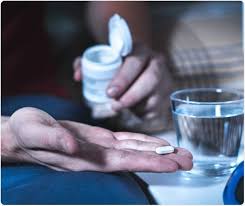Source: news.yahoo.com
High blood pressure pills may work better when taken at bedtime, research suggests.
In the largest study of its kind, scientists from the University of Vigo in Spain looked at when more than 19,000 patients took their hypertension medication.
The team found those who took the pills at bedtime had nearly half the risk (45%) of dying from heart disease over the next six years compared to the participants who had the medication upon waking.
The night time regimen also reduced the patients’ risk of a heart attack, stroke and heart failure, when the organ does not pump blood around the body as effectively as it should.
Experts believe a patient’s body clock may change how they respond to the medication.
“Current guidelines on the treatment of hypertension do not mention or recommend any preferred treatment time,” lead author Professor Ramon Hermida said.
“Morning ingestion has been the most common recommendation by physicians based on the misleading goal of reducing morning blood pressure levels.
“The results of this study show patients who routinely take their anti-hypertensive medication at bedtime, as opposed to when they wake up, have better-controlled blood pressure and, most importantly, a significantly decreased risk of death or illness from heart and blood vessel problems.”
Past research by the same scientists suggests nighttime blood pressure is the “most significant and independent indication of cardiovascular disease risk”.
To learn more, the team divided 19,084 adults with high blood pressure into two groups. The first were told to take all their hypertension drugs at bedtime, while the second were instructed to have the medication upon waking.
The patients who followed for an average of around six years. At least once a year, their blood pressure was monitored continuously via a cuff over 48 hours.
Results, published in the European Heart Journal, show taking hypertension pills at bedtime reduced the participants’ risk of death caused by heart disease.
It also lowered their risk of stroke by 49%, a heart attack by 44%, heart failure by 42% and coronary revascularisation by 40%. Coronary revascularisation is surgery to widen narrowed or blocked arteries.
These patients also had lower blood pressure throughout the day, with it particularly “dipping” at night. Blood pressure should naturally decline during sleep – failure to do so can put a person at risk of heart disease.
The results remained true even after the scientists adjusted for other factors linked to poor heart health, like type 2 diabetes, smoking and high cholesterol.
“The findings indicate average blood pressure levels while asleep and nighttime blood pressure dipping, but not daytime blood pressure or blood pressure measured in the clinic, are jointly the most significant blood pressure-derived markers of cardiovascular risk,” Professor Hermida said.
“Accordingly, round-the-clock ambulatory blood pressure monitoring should be the recommended way to diagnose hypertension and to assess the risk of cardiovascular disease.”
Ambulatory monitoring involves a patient wearing a cuff that records their blood pressure at regular internals throughout the day and night.
Dr Paul Leeson, professor of cardiovascular medicine at the University of Oxford, said: “This study has the potential to transform how we prescribe blood pressure medication.
“The scale of the project, length of follow up and size of effect are impressive. Importantly, this is a ‘real world’ study where doctors were allowed to prescribe whatever they wanted and just change medication timing. This means the findings are likely to be relevant to most people who take tablets for high blood pressure.
“Where the benefit comes from remains unclear. Does this improve patterns of sleep? Are side effects less problematic at night? Does blood pressure overnight better reflect heart health?”
The scientists stress the participants all slept at night time, therefore it is unclear if the same results would occur among shift workers. All the participants were also white and of Spanish descent. Different results may apply to other ethnic groups, they added.
The team are looking into the “ideal” blood pressure readings during sleep to reduce a patient’s heart disease risk.
“If you’re taking blood pressure medication, it’s important to check with your GP or pharmacist before changing the time you take it,” Vanessa Smith, senior cardiac nurse at the British Heart Foundation, told the BBC.
“There may be specific reasons why your doctor has prescribed medication in the morning or night.”
